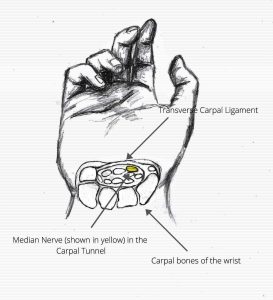About
The carpal tunnel is a narrow tunnel on the palmar side of your wrist which is formed
by the bones of the wrist (the carpal bones) and the ‘transverse carpal ligament’. Carpal Tunnel Syndrome is caused by compression or irritation of the median nerve through the ‘carpal tunnel’ of the wrist, causing pain and discomfort or numbness and tingling in the hand and fingers.
Symptoms
If you have carpal tunnel syndrome you may experience any of these symptoms.

- numbness or tingling of the thumb, index & middle and half of the ring finger
- pins & needles in the hand and fingers especially at night time
- a radiating burning feeling into your hand, wrist or arm
- night time pain in the arm/wrist
- possible weakness of the hand and thumb, dropping things easily
Causes
Carpal tunnel has a number of causes, some of the common causes are:
- Arthritis or autoimmune disorders (can cause swelling of the carpal tunnel ligament)
- Fluid retention in the wrist (this can occur during pregnancy or menopause)
- Wrist trauma (such as a wrist fracture or break)
- Repetitive actions through sport or work (leading to an overuse injury)
- Genetic factors (some people have underdeveloped or smaller carpal tunnels than others)
- The position of your wrist at night can contribute to increased pressure in the carpal tunnel
Risk Factors
Whilst risk factors do not dictate that you will develop carpal tunnel syndrome, they may increase the likelihood of developing the condition.
- Having certain types of arthritis
- Repetitive day-to-day work/hobbies (e.g. working on an assembly line, professional bowler)
- Pregnant women or women going through menopause
- High body mass index (BMI)
Non-Surgical/ Conservative management
Options
Carpal Tunnel Syndrome can lead to long term damage of the hand and wrist if not properly addressed. Our therapists can assess for the presence of Carpal Tunnel Syndrome and if appropriate, fit you with a wrist splint which is worn primarily at night time to help settle the symptoms and pain. They will also talk to you about possible causes and preventative strategies to help, as well as other treatment options available. See below for a list of possible interventions we may recommend:
- Wearing specially fitted wrist splints to help keep the carpal tunnel open and take pressure off the median nerve
- Hand Therapy/Occupational Therapy exercises and nerve glides that are appropriate
- Discussing alternative ways of performing specific aggravating activities
SURGICAL TREATMENT
Your GP or Specialist may recommend surgical release of the carpal tunnel in more moderate to severe cases or for ongoing problems. The surgery involves releasing the carpal ligament to relieve pressure on the median nerve. Post-operative therapy can be a very important aspect of your recovery, and at Specialised Hand Therapy we also see many patients following carpal tunnel surgery.
Specialised Hand Therapy Services Can Help
At Specialised Hand Therapy Services, Carpal Tunnel Syndrome is one of the most common injuries we see. If you are experiencing pain or discomfort in your wrist or hand and live in the Perth or regional WA area then book in with one of our therapists for assessment and advice.


